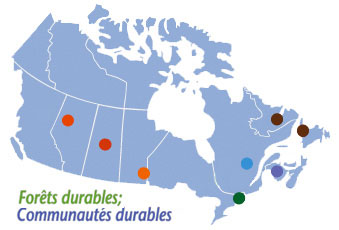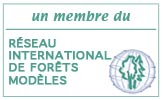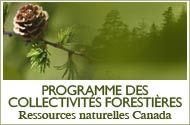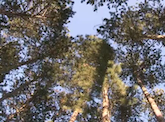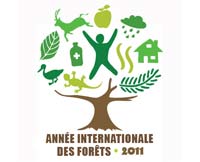African Model Forest Network Meets CMFN in a Sugar Bush
The CMFN, EOMF and IMFN co-hosted a delegation visiting Ottawa from the African Model Forest Network (AMFN). For this visit, the AMFN had meetings at, and toured, Temple's Sugar Camp in Lanark County. Their principle interest for the Canadian visit was to gain new insights into developing their own non-timber forest product (NTFP) industries by learning about the Canadian experience.
Leanne Elliott from CMFN outlined several NTFP projects being conducted by Model Forests throughout Canada including the cultivation of blueberries and other berry crops, mushrooms and other forest edibles, eco- and ethno-tourism development with South American indigenous tribes, and the production of a Goods from the Woods Directory.
Mark Richardson, EOMF's General Manager, described the local maple syrup industry as well as how and why using forest certification is an effective management tool. We were pleased to learn many of their surrounding forests in the Congo basin are FSC-certified - so were asked to also describe the Chain of Custody Certification process. We also touched on some potential opportunities around the development of other NTFP's such as wood turning.
The gracious and friendly African delegates described that most of their NTFP management is performed by women cooperatives, or 'platforms', that come together from surrounding villages to work on projects that utilize 'waste' wood gathered from the jungle floor. One ongoing project that has proven the model, is turning gorgeous exotic wood pens for the export market. Facilitation of the machinery and training was enabled by the Lac-Saint-Jean Model Forest in Quebec who has had a long-standing working relationship with the french-speaking countries represented in the African Model Forest Network. Another initiative involves the cultivation of heritage foods from their forest locales - including Giant Snails - once a popular staple among their ancestors. Our guests came from Cameroon (home-base for the AMFN), the Democratic Republic of Congo, and the Central African Republic. Now that we share coordinates, we also hope to share and transfer more knowledge with them into the future as needs and opportunities arise.
J. Michael Waldram Memorial Model Forest Fellowship Award Winners
The CMFN and the Canadian Institute of Forestry (CIF) presented the J. Michael Waldram Memorial Model Forest Fellowship Award to two deserving students at the CIF's 103rd Annual General Meeting this past September in Huntsville, Ontario. Each annual fellowship is worth $1000 and is open to all Canadian Aboriginal youth who are enrolled in at least the second year of a university or college program in natural resource management.
The 2011 award winners were selected from a host of impressive young applicants. Congratulations to: Katlin Young attending the College of the North Atlantic, and Ernie Last attending the Nicola Valley Institute of Technology.
The J. Michael Waldram Memorial Model Forest Fellowship was established in 2008 by the CMFN in honour of Mike Waldram, General Manager of the Manitoba Model Forest from 1993 to 2006. As General Manager, Waldram strove to enhance the participation of Aboriginal peoples in the Model Forest and in forest resource management. Thanks to CIF for presenting this symbolic award annually and to their President Wayne Kelly for doing the honours.
For more details including applications, please visit: www.modelforest.net and select the Michael Waldram Fellowship button on the bottom of our home page.
Canadian Model Forest Network Appoints General Manager
The Board of Directors of the Canadian Model Forest Network (CMFN) is pleased to announce the appointment of Leanne Elliott as General Manager. Leanne is a graduate of the Masters of Forest Conservation Program of the Faculty of Forestry, University of Toronto. She has worked with the CMFN for two and half years, taking on progressively greater roles and responsibilities over time. Most recently, she has been the network's National Coordinator. Leanne has been instrumental in helping the CMFN to develop a highly effective collaborative network approach which has enabled it to achieve its numerous objectives under the Forest Communities Program.
From the beginning, she has worked diligently and effectively on progressing the CMFN's National Initiatives as well as other key projects from coast to coast. Leanne is also involved in facilitating the sharing of information between CMFN's members and partners, providing the opportunity for collaboration between groups with similar interests. She has liaised directly with strategic partners as well as Board representatives, General Managers and various other project personnel of the CMFN's 14 member Model Forests – earning their trust and friendship as she built relationships along the way. Leanne continues to play a key role in increasing the network's level of engagement with the International Model Forest Network and expanding the CMFN partnership base.
As General Manager she will be responsible for key program planning, implementation and administrative functions fundamental to the operation of the CMFN as a federally incorporated, not for profit organization. The national office of the CMFN is based in Kemptville, Ontario where it works to support the efforts of its member sites located across Canada. Congratulations Leanne!
Radio Canada Interviews Colette Robertson from LSJMF and Hélène Eboto from Cameroon
On October 20, two dynamic women from Model Forests on two different continents were interviewed together by Radio Canada: Colette Robertson, President of the Lac-Saint-Jean Model Forest (LSJMF); and Hélène Eboto, Founder of the Platform of women in Campo Ma'an, a Model Forest in Cameroon. They took turns answering questions which revealed that, despite coming from two dramatically different geographical and cultural areas, they share many common forest interests and values as well as challenges.
The two Model Forests have collaborated on some joint initiatives over the past few years – particularly around transferring knowledge and expertise on the cultivation of local 'non-timber forest product' economies (such as edible 'goods from the woods'), as well as the production of value-added wood products. Both Model Forests seek new and innovative ways to generate economic wealth at the community level that goes beyond traditional timber harvesting. For example, Lac-Saint-Jean has facilitated technology and skills transfer that has enabled the Platform of women in Campo Ma'an to create beautiful wooden pens from fallen timber that they can in turn sell for much needed revenue.
Hélène recounts that at first people in her African community were scared of the of the Model Forest concept, but once the women embraced it, then it became a very positive and broadly-supported initiative. Both entities pride themselves in bringing diverse groups, such as different tribes and ethnic groups, 'to the table' in order to find common ground and work together for solutions to issues and challenges facing their communities and forests. To listen to the full interview please visit: Radio Canada
Publication en Vedette
Veuillez cliquez ici pour les nouvelles des membres
Établir des liens entre les partenaires
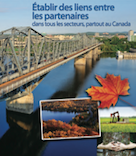 Établi au Canada pour répondre à une demande, nationale et internationale, de pratiques de gestion durable de la forêt, le Réseau canadien de forêts modèles (RCFM) a été créé au début des années 1990.
Établi au Canada pour répondre à une demande, nationale et internationale, de pratiques de gestion durable de la forêt, le Réseau canadien de forêts modèles (RCFM) a été créé au début des années 1990.
Publications récentes
-
Production d'électricité et de chaleur à partir de la biomasse : Un guide pour les communautés rurales au canada
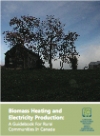
Le Canada est un pays riche en ressources qui soutient une foule d'industries de ressources renouvelables et non renouvelables. Les Canadiens sont les intendants d'une grande partie des forêts tempérées et boréales de la planète. Ces forêts offrent un éventail de services écologiques : de la purification et de l'entreposage de l'eau, la protection de la qualité de l'air, contre les inondations, l'érosion à la création d'habitats fauniques. Les forêts jouent également un rôle clé dans l'atténuation des changements climatiques. En effet, selon les estimations, les forêts canadiennes piègent 95 milliards de tonnes de carbone. Les forêts offrent un éventail de valeurs économiques : des produits conven- tionnels aux valeurs récréatives, au piégeage et au potentiel de production énergétique.
-
Mettre à profit les forces de votre communauté
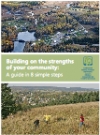
Chaque forêt modèle fonctionne au niveau régional pour promouvoir la gestion durable des paysages forestiers importants grâce à la recherche, l'éducation et les projets appliqués. Forêts Modèles soutenir les collectivités forestières en rassemblant les informations, les outils et les meilleures pratiques nécessaires pour surmonter les obstacles et identifier de nouvelles opportunités. Ce guide a été élaboré dans le cadre du développement socio-économique du programme d'indicateurs. Il est soutenu par un comité de pilotage des membres du RCFM et des partenaires de partout au pays.
-
Voies vers la résilience au changement climatique
Le présent guide et la Collection de ressources pour les collectivités qui l’accompagne ont été conçus en partant du principe que les collectivités rurales canadiennes en milieu forestier désirent être orientées pour comprendre et passer à l’action afin de réduire les impacts du changement climatique. Le recueil d’information et d’outils existants en un cadre pratique a constitué la première étape de l’initiative.
For Resource Collection Click Here and for the Guidebook Click Here
